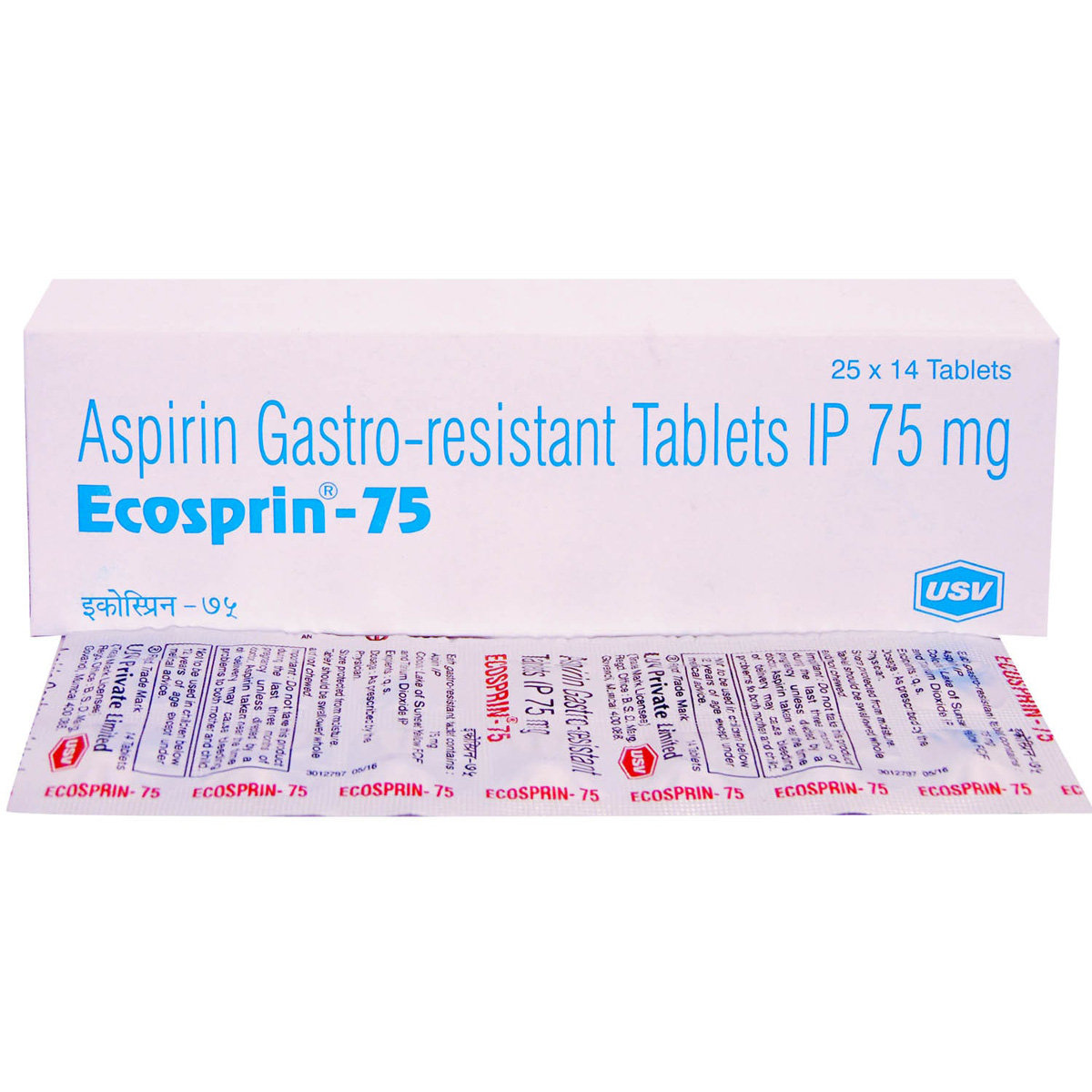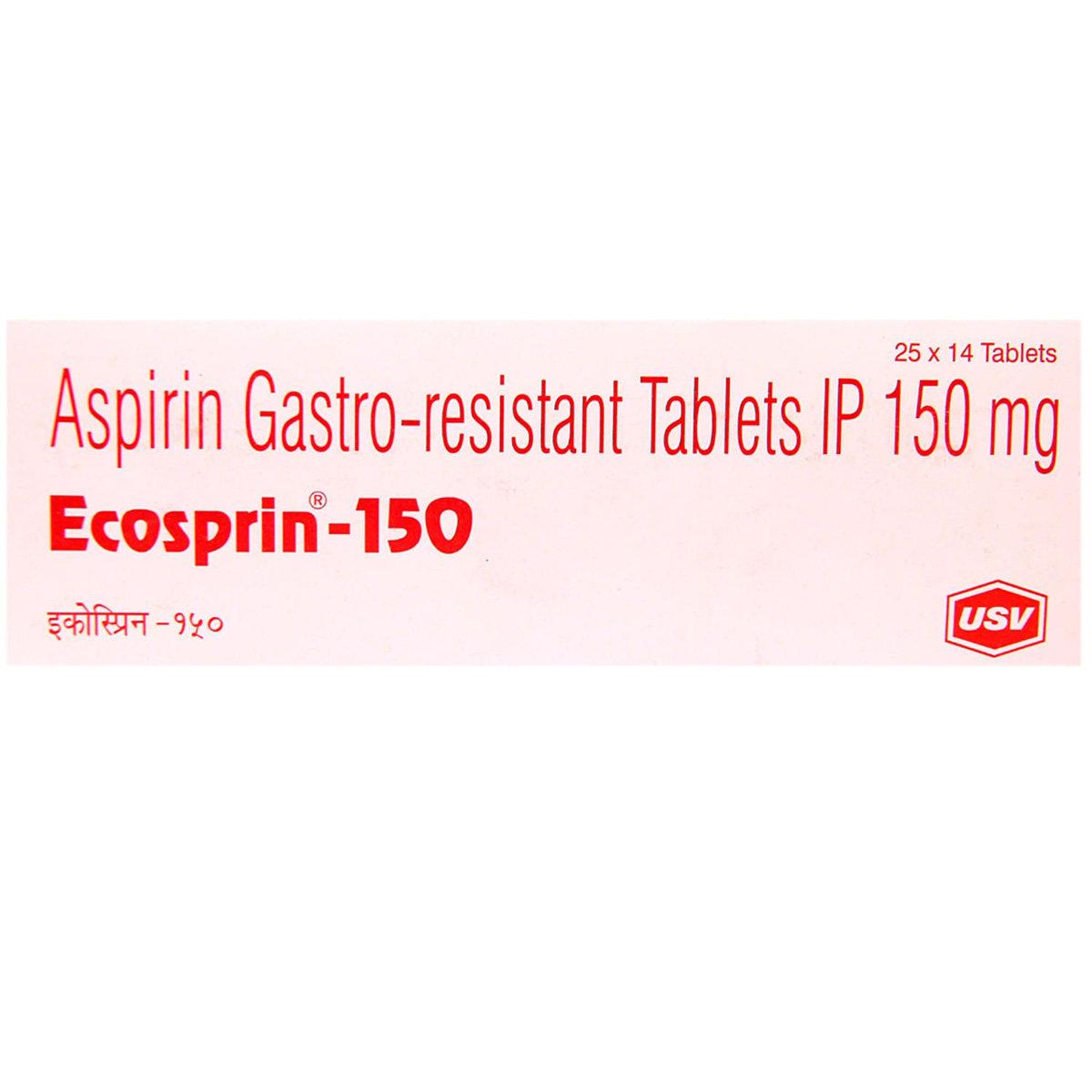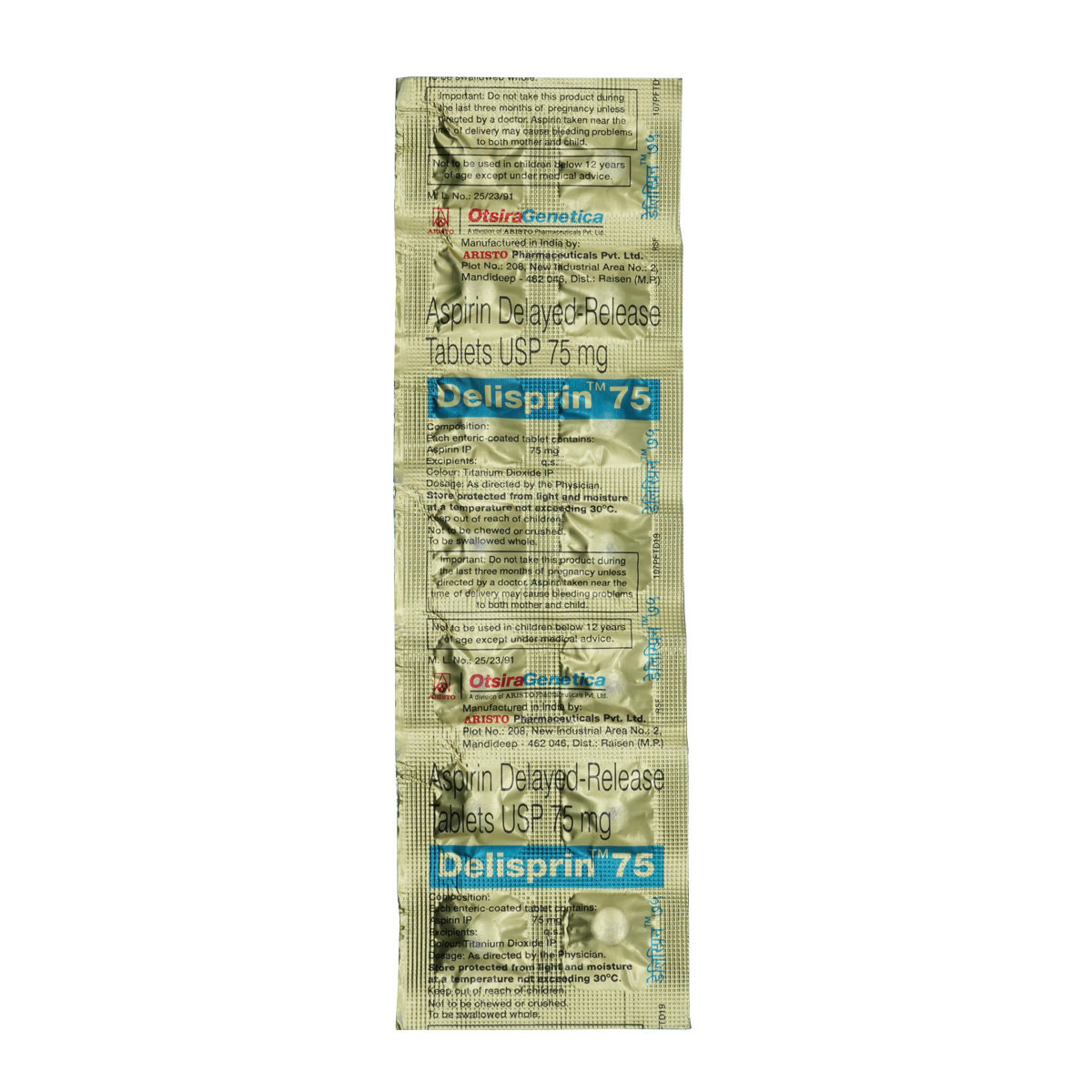Aspirin
About Aspirin
Aspirin belongs to the class of anti-inflammatory and blood-thinning/antiplatelet agents. Its use varies according to its strength. In a low dose (about 75 mg), Aspirin acts as a blood-thinning or antiplatelet agent used to prevent heart attack and stroke. On the other hand, in high dose (about 325 mg) acts as an analgesic, relieving minor aches, pains and fevers. Your doctor may also prescribe Aspirin immediately after a heart attack to prevent further clots and heart tissue death. A heart attack generally refers to the blocked flow of blood due to blocked arteries. This blockage is due to the build-up of fat, cholesterol and other substances (plaque) in arteries.
Aspirin plays a vital role in the thinning of blood by its anti-platelet activity to decrease the risk of blood clot formation and subsequent heart attack. Low-dose aspirin makes the blood less sticky, preventing the risk of heart attack and stroke. Besides this, it inhibits the activity of the cyclooxygenase (COX) and prostaglandins (PGs) that cause inflammation, swelling, pain and fever.
You can take Aspirin with food or without food. It should be swallowed whole with a glass of water. Do not chew, bite, or break it. Your doctor will advise you how often you take your tablets based on your medical condition. Aspirin can be given through oral and rectal routes. In some cases, you may experience stomach upset, heartburn, drowsiness, mild headache, ankle swelling (oedema), slow heart rate, and nausea. Aspirin is known to cause dizziness, so driving should be avoided. Most of these side effects of Aspirin do not require medical attention and gradually resolve over time. However, if the side effects are persistent, reach out to your doctor.
You should avoid drinking alcohol, taking painkillers (ibuprofen, ketorolac) and the abortion pill (mifepristone) with Aspirin as together it can increase your risk of stomach or gastric bleeding. Aspirin should not be given to children with flu, fever, or chickenpox until the doctor has prescribed it. Aspirin can cause Reye's syndrome (a rare but serious condition with swelling in the brain and liver common in children and teenagers). Do not use Aspirin during the last trimester of pregnancy due to possible harm to the unborn baby. Aspirin passes into the breast milk and may harm the nursing infant. So tell your doctor if you are pregnant, planning for pregnancy, or breastfeeding mother before taking Aspirin. Many people using Aspirin do not have serious side effects. However, tell your doctor if you have stomach upset, mild indigestion, easy bruising or bleeding, difficulty in hearing, ringing in the ears, dark urine, change in the amount of urine, persistent or severe nausea/vomiting, unexplained tiredness, dizziness, and yellowing of eyes/skin (jaundice). Aspirin may increase the risk of gastrointestinal bleeding (from the stomach/intestine), intracranial bleeding (bleeding in the brain) or other areas of the body. So, after consulting a doctor only, you should take Aspirin.
Uses of Aspirin
Medicinal Benefits
Low dose of Aspirin acts as a blood thinner preventing blood cells sticking together and forming a blood clot in the arteries of the heart. This decreases the risk of having any heart attack or stroke in future. A high dose of Aspirin inhibits the activity of the cyclooxygenase (COX) and prostaglandins (PGs) that cause inflammation, swelling, pain, and fever.
Directions for Use
Storage
Side Effects of Aspirin
- Stomach upset
- Heartburn
- Easy bruising/bleeding
- Difficulty in hearing
- Ringing in the ears
- Change in the amount of urine
- Persistent or severe nausea/vomiting
- Unexplained tiredness
- Dizziness
- Dark urine
- Yellowing eyes/skin (jaundice)
Drug Warnings
You should avoid drinking alcohol, taking pain killers (like ibuprofen, naproxen, ketorolac), and the abortion pill (mifepristone) with Aspirin. Together intake can increase the risk of gastric bleeding and lower efficiency of Aspirin in preventing heart attack and stroke. Aspirin should not be given to the children with flu, fever, or chickenpox until the doctor has prescribed it. Aspirin can cause Reye's syndrome (rare but serious condition with swelling in the brain and liver common in children). Do not use Aspirin during the last trimester of pregnancy due to possible harm to the unborn baby. Aspirin passes into the breast milk and may harm the nursing infant. So tell your doctor if you are pregnant, planning for pregnancy, or breast-feeding mother before taking Aspirin. Aspirin may increase the risk of gastrointestinal bleeding (from the stomach/intestine), intracranial bleeding (bleeding in the brain) or, other areas of the body. Aspirin may interfere with laboratory tests like urine sugar tests possibly causing false test results. Make sure laboratory personnel and doctors know that you are taking Aspirin. Before taking Aspirin tell your doctor if you have a stomach ulcer, bleeding disorder, low Vitamin K, aspirin induced asthma, allergic to Aspirin or other pain killers, kidney disease, liver disease, diabetes, or going to have any type of surgery.
Drug Interactions
Drug-Drug Interaction: Aspirin is shown to interact with various drugs. Some of them includes blood thinners (warfarin, heparin, phenindione, clopidogrel), immune related drugs (cyclosporin, tacrolimus), high blood pressure pills (captopril, metoprolol), heart disease related pills (acetazolamide, digoxin), antidepressant (fluoxetine, sertraline, lithium), pain killers (ketorolac, naproxen, ibuprofen), steroids, gout drug (probenecid), anti-epilepsy drug (valproate, phenytoin), anti-cancer or anti-arthritis drug (methoxtrexate), anti-diabetic pills (glibenclamide), abortion pill (mifepristone), acetazolamide, and osteoporosis related drug (oral alendronate).
Drug-Food Interaction: Taking Aspirin along with alcohol, caffeine and herbal supplements like ‘ginkgo biloba’ can affect the working and potentiate the side effect of this medicine.
Drug-Disease Interaction: Aspirin should not recommend for people having blood clotting disorder (haemophilia), bleeding disorder, von Willebrand's disease, or telangiectasia, asthma, liver/kidney problem, stomach or intestinal ulcer, severe heart problems which can cause shortness of breath.
Drug-Drug Interactions Checker List:
Safety Advice

Alcohol
unsafeYou are recommended not to consume alcohol along with Aspirin, as together it may potentiate side effects like stomach ulcer and gastric bleeding.

Pregnancy
unsafeConsume only if prescribed by your doctor.

Breast Feeding
unsafeTake Aspirin only when prescribed, it is known to pass on in a limited quantity via breast milk to the child.

Driving
safe if prescribedAspirin does not interfere with the ability to drive.

Liver
cautionAspirin to be taken with caution, especially if you have a history of liver diseases/conditions. Dose may have to be adjusted by your doctor.

Kidney
cautionAspirin to be taken with caution, especially if you have a history of Kidney diseases/conditions. Dose may have to be adjusted by your doctor.

Children
unsafeLow-dose Aspirin also called as 'baby aspirin' is not safe for children. So, never give Aspirin to a child younger than 16, unless their doctor prescribes it.
Habit Forming
Diet & Lifestyle Advise
- Low cholesterol diet along with a regular exercise regime is found to complement treatment with Aspirin effectively.
- Avoid alcohol as it may increase the risk of gastrointestinal bleeding (stomach bleeding).
- The high-fat meal should be avoided as it may further increase the risk of heart attack, and instead, eat heart-healthy foods.
- As a precautionary measure, you are recommended not to consume junk food items from outside, stick to freshly prepared home-cooked meals and take proper rest for a speedy recovery.
- And also, trying to replace most of your saturated fats with unsaturated fats can reduce total cholesterol and LDL cholesterol in a short span of time.
- Foods like avocados, olive oil, fatty fish and nuts contain lots of heart-healthy unsaturated fats, so it’s beneficial to eat them regularly.
Special Advise
Aspirin can cause stomach bleeding. Please consult your doctor if bleeding does not stop.
Patients Concern
Disease/Condition Glossary
A heart attack occurs when the flow of blood to the heart is blocked due to the deposition of plaque (fat/cholesterol) in the arteries wall (coronary arteries) that nourish the heart. In some cases, plaque can rupture and form a blood clot that blocks blood flow. On the other hand, a stroke is a medical emergency condition in which blood supply to the brain is reduced or blocked, preventing brain cells (neurons) from getting sufficient oxygen and nutrients. As a result, brain cells begin to die in few minutes.
FAQs
Yes, taking Aspirin can cause stomach upset. So, please take Aspirin with a meal to avoid it or do as advised by your doctor.
Yes, Aspirin is used for thinning of blood. It works by preventing platelets (type of blood cells) from sticking together and forming clots.
In most cases, doctor asks you to stop taking Aspirin few days prior to your surgery so as to prevent excessive blood loss during the surgery.
Reye's syndrome is a rare and serious disease which generally occurs in children if Aspirin is given to treat viral infection like small pox, and chicken pox.
Yes, Aspirin can cause stomach bleeding and it can increase in patients consuming alcohol along with Aspirin. Please consult your doctor if bleeding does not stop and do as advised.
If you are asthmatic, having hay fever or any other chronic respiratory diseases, taking Aspirin may induce an asthma attack and even worsen your condition. So, please inform your doctor before taking Aspirin if you are asthmatic.
Daily use of Aspirin with ibuprofen may decrease the efficiency of Aspirin's ability to prevent heart attak and stroke as blood thinner.
No. Aspirin should not be used for the relief of stomach pain. In case you have stomach pain it might be the sign of gastric bleeding, or heartburn which can be one of the side effect of the Aspirin.
Yes. Taking with milk or snack can prevent the symptoms of stomach upset.
Children and teenagers should not take Aspirin if they have flu, chickenpox, or any undiagnosed illness. Besides this, if they have taken any vaccination recently, taking Aspirin might increase the risk of Reye's syndrome, a rare but serious illness. Your doctor will decide whether to prescribe in children or teenagers or not.







